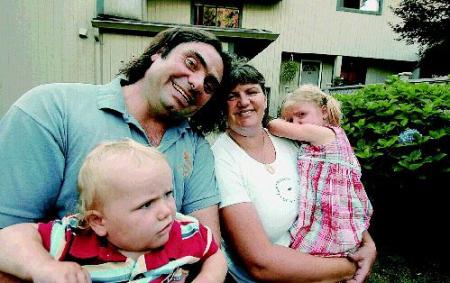Mortgage rates, price gains erode Vancouver affordability
Michael Kane
Sun

A zero down payment was what got Sean and Anna Carter, their baby Jake and Zoe, into their condo in Port Moody. Photograph by : Steve Bosch, Vancouver Sun
British Columbia‘s already prohibitive housing affordability levels deteriorated even further during the second quarter of 2007, the Royal Bank said Wednesday.
It is part of a countrywide slide — the largest and most broad-based since the mid-1990s — driven by a combination of higher house prices, mortgage rates, utilities and property taxes.
Yet despite requiring more household income to buy a home, record sales were recorded across the province over the summer, said Cameron Muir, chief economist with the BC Real Estate Association.
That has a lot to do with boomers who are taking equity from their principal residences to buy investment property, or recreational properties that are potential retirement residences, Muir said in an interview.
There are also buyers like teacher Sean Carter, 41, who thought the market had passed him by until a 40-year mortgage through Vancouver mortgage brokers Invis allowed him to stop renting and get into a Port Moody townhouse with zero down.
The plan is to accelerate payments after five years when wife, Anna, 38, can return to work, and children, Zoe, 3, and Jake, 1, will be in school, Carter said in an interview. The couple spent many years working with youth in outdoor education, which is not high-paying, and have also each invested in earning a master’s degree, which eroded their savings.
The RBC affordability index measures the proportion of pre-tax household income needed to service the costs of owning a home. The higher the reading, the more costly it is to afford a home.
Across B.C., a standard two-storey home stands at 68 per cent, followed by a detached bungalow at 65 per cent, a standard townhouse at 48 per cent, and a standard condo at 34 per cent.
In Vancouver, rising mortgage rates and price gains eroded affordability in all segments, although the annual pace of house price gains has slowed from the 18-20 per cent range to 10 to 12 per cent, said RBC economist Derek Holt.
On the affordability index for cities, a detached bungalow costs 71 per cent of household income in Vancouver, compared to 45 per cent in both Toronto and Calgary, 36 per cent in Montreal, and 31 per cent in Ottawa.
In other Vancouver categories, a standard-two storey home stands at 73 per cent, a standard townhouse at 51 per cent, and a standard condo at 35.5 per cent, up from 33 during the previous quarter.
“Even though trends for Vancouver are shifting to a slower pace and moving toward moderation, the near-term result is another hit to already stretched affordability conditions,” Holt said.
For example, an average mortgage payment on a two-storey home in Vancouver is $3,230 a month. Extending that mortgage from a 25-year term to a 40-year term reduces the monthly payment by roughly $400.
According to RBC, affordability eroded in the second quarter in every single housing class, in every province and in every major city across Canada.
While Vancouver remains the country’s most expensive real estate market, the largest affordability slides over the last couple of years have been suffered by Saskatoon, Edmonton and Calgary.
Alberta is still, however, avoiding British Columbia‘s stressed affordability conditions, Holt said.
Muir noted first-time buyers in B.C. typically purchase condos, which “are still very much affordable” for those with average incomes.
“The single detached home with the large lawn is increasingly becoming out of reach for first-time buyers and, if aspired to, will take a couple of home movements over time to achieve.”
© The Vancouver Sun 2007

